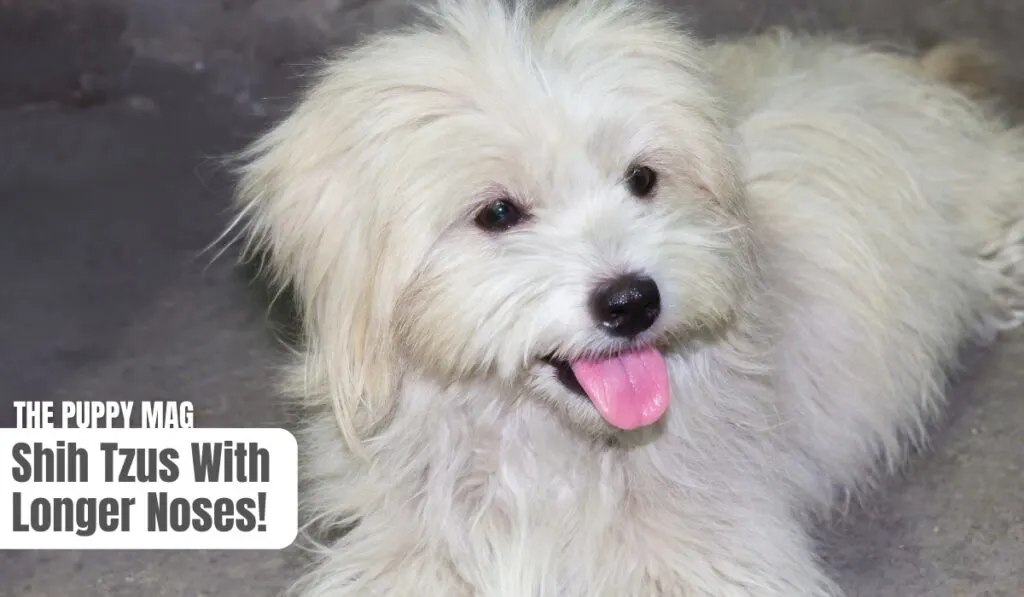Those adorable little dogs with their distinctive smooshed faces and luxurious coats. But wait, have you ever come across a Shih Tzu with a long nose?
It’s quite a rare sight, isn’t it? Let’s dive into this curious question: Can Shih Tzus ever have long noses?

The Typical Shih Tzu: A Snapshot
In general, Shih Tzus are known for their short, pushed-in noses, part of the breed’s brachycephalic facial structure.
This unique appearance gives them their unmistakable charm.
But what about those exceptions? Well, to be honest, they do exist. Some Shih Tzus can actually have longer noses.
Shih Tzus CAN Have Longer Noses…
Believe it or not, a Shih Tzu’s nose can appear longer for various reasons. Here’s the low-down:
- Genetic Variation: Sometimes, genes can be unpredictable. A Shih Tzu may inherit a gene that leads to a longer nose. It’s not COMMON, but it’s not impossible either.
- Breeding Practices: If a Shih Tzu is mixed with a breed known for a longer nose, the resulting offspring may exhibit a more elongated snout.
- Health Factors: Although rare, certain health conditions might affect the appearance of a Shih Tzu’s nose.
Comparing the Noses: Short Vs. Long
Curious about the differences? Here’s a handy comparison:
| Aspect | Short Nose | Long Nose |
|---|---|---|
| Appearance | Compact, flat | Elongated, protruding |
| Breathing | May cause issues | Typically easier |
| Breed Standard | Conforms | May be a deviation |
The longer nose might appear peculiar on a Shih Tzu, but in fact, it could lead to fewer respiratory problems, a common concern for brachycephalic breeds.
In the long run, this could actually impact their overall healthy and well-being in a positive way. Something to consider!
Owning or Breeding a Long-Nosed Shih Tzu: What to Know
Owning or breeding a Shih Tzu with a longer nose might be different from what you expect with the traditional short-snouted Shih Tzu. Here’s what you should know:
1. Health Considerations
A Shih Tzu with a longer nose might be less prone to breathing issues common in brachycephalic dogs. Sounds great, right? Well, it often is, but always consult a vet to make sure there are no underlying health concerns.
2. Potential Mixed Breeding
A longer nose could be a sign of mixed breeding. In fact, if you’re considering adopting or purchasing, understanding the dog’s lineage can be important for health and temperament considerations.
3. Show Considerations
For show enthusiasts, a longer nose might not conform to the breed standard. It’s not a BAD thing, but it’s something to be aware of if you have competition aspirations.
4. Grooming and Care
Does a longer nose affect grooming and care? Not necessarily, but it might change the facial appearance, and thus, the standard grooming practices for Shih Tzus may vary slightly.
A Thought for Breeders
For breeders aiming for a traditional Shih Tzu appearance, understanding the genetics and lineage is crucial. A longer nose might appear in a litter unexpectedly, and understanding why can help in future breeding practices.
Engaging with Fellow Dog Lovers
How about YOU? Have you had experience with a long-nosed Shih Tzu, either as an owner or breeder? What unique challenges or joys have you encountered? Your insights would be valuable to others navigating this intriguing aspect of Shih Tzu ownership.
Last Thoughts
Long-nosed Shih Tzus might not be the norm, but they can be a delightful variation on a beloved breed.
With proper care, understanding, and love, these extraordinary pups can be just as charming and lovable as their shorter-nosed counterparts.
So, whether you’re a proud owner or just a curious onlooker, let’s celebrate the diversity and uniqueness of our canine companions.
After all, isn’t that what makes being a dog lover so much fun? Feel free to share your stories, pictures, and thoughts below! 🐶
